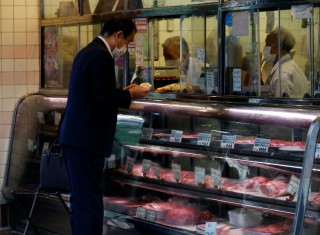Loading
Search
▼ Japan's Inflation Slows To 2.8% In Sept As Energy Impact Lessens
- Category:Other
Japan's core consumer prices rose 2.8 percent in September, the slowest pace in about a year, amid the moderating effects of fuel price rises, though the increase was still well above the Bank of Japan's inflation target, government data showed Friday.
The pace of increase in the nationwide core consumer price index excluding volatile fresh food items was above the BOJ's 2 percent goal for the 18th straight month, underscoring that recent inflationary pressures, driven largely by higher import costs on the back of the weak yen, have become entrenched. It eased from a 3.1 percent rise in August.
While the BOJ expects cost-push inflation to slow in the coming months, the central bank is expected to raise its current core CPI forecast for fiscal 2023, from 2.5 percent to near 3.0 percent, sources familiar with the matter have said. A fresh outlook report will be released at the end of a two-day policy meeting in late October.
Stripping away both energy and fresh food items, the so-called core-core CPI rose 4.2 percent, slowing slightly from a 4.3 percent rise in August.
Rising prices are posing a challenge to policymakers at a time when real wages have been consistently declining.
The government plans to draw up an inflation-relief package, with an income tax cut floated as a viable possibility by Prime Minister Fumio Kishida, whose public support has fallen sharply amid the cost-of-living crisis.
Energy prices fell 11.7 percent, marking the sharpest drop in over seven years. Electricity prices tumbled 24.6 percent and city gas sank 17.5 percent, both the largest-ever drops.
Government subsidies to lower fuel costs have helped ease some inflationary pressures. Without them, core CPI would have risen 3.8 percent in September, according to the ministry.
Food prices, meanwhile, gained 8.8 percent.
"Companies are expected to continue raising prices to pass on higher costs, maintaining the squeeze on households," said Yoshiki Shinke, senior executive economist at the Dai-ichi Life Research Institute.
"We expect the year-on-year rise in core CPI to slow going forward but there remains high uncertainty over its pace," Shinke said, noting that companies will speed up price hikes if crude oil prices continue to rise and the yen remains weak.
Conflict in the Middle East has raised concerns about crude oil supply and its negative impact on the global economy, as the Israel-Hamas war continues.
Japan's heavy reliance on energy imports makes it vulnerable to swings in crude oil prices, with Russia's war in Ukraine one of the main factors behind the recent bout of inflation in the resource-scarce nation.
The BOJ has diverged from other major central banks that have already raised interest rates aggressively to curb surging inflation amid the Ukraine war and an economic recovery from the COVID-19 pandemic.
Still, inflation expectations are gradually rising and Japanese firms have become more amenable to raising wages to help workers cope with rising prices.
Economists are keeping tabs on whether price hikes, which have largely centered on goods, will spread further to services, a key factor in determining whether stable inflation can be attained, backed by solid domestic demand.
Services prices increased 2.0 percent in September, the same pace seen in August.
"There have been cases in which companies in the restaurant sector are going ahead with price hikes to reflect not just higher raw material costs but also personnel costs," a ministry official said.
© KYODO
- October 20, 2023
- Comment (0)
- Trackback(0)


